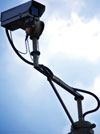

Do security cameras really reduce crime and make law enforcement easier?
Pervasive security cameras do not substantially reduce crime. There are exceptions, of course, and that is what gets the press. Most famously, CCTV cameras helped catch James Bulger's murderers in 1993. And earlier this year, they helped convict Steve Wright of murdering five women in the Ipswich area. But these are the well-publicised exceptions.
Overall, CCTV cameras are not very effective.
This fact has been demonstrated again and again: by a comprehensive study for the Home Office in 2005, by several studies in the US, and again with new data announced last month by New Scotland Yard. They actually solve very few crimes, and their deterrent effect is minimal.
Conventional wisdom predicts the opposite. But if that were true, then camera-happy London, with something like 500 000, would be the safest city on the planet. It is not, of course, because of technological limitations of cameras, organisational limitations of police and the adaptive abilities of criminals.
To some, it is comforting to imagine vigilant police monitoring every camera, but the truth is very different. Most CCTV footage is never looked at until well after a crime is committed. When it is examined, it is very common for the viewers not to identify suspects. Lighting is bad and images are grainy, and criminals tend not to stare helpfully at the lens. Cameras break far too often. The best camera systems can still be thwarted by sunglasses or hats. Even when they afford quick identification - think of the 2005 London transport bombers and the 9/11 terrorists - police are often able to identify suspects without the cameras. Cameras afford a false sense of security, encouraging laziness when we need police to be vigilant.
The solution is not for police to watch the cameras. Unlike an officer walking the street, cameras only look in particular directions at particular locations. Criminals know this, and can easily adapt by moving their crimes to someplace not watched by a camera - and there will always be such places. Additionally, while a police officer on the street can respond to a crime in progress, the same officer in front of a CCTV screen can only dispatch another officer to arrive much later. By their very nature, cameras result in underused and misallocated police resources.
Cameras are not completely ineffective, of course. In certain circumstances, they are effective in reducing crime in enclosed areas with minimal foot traffic. Combined with adequate lighting, they substantially reduce both personal attacks and auto-related crime in car parks. And from some perspectives, simply moving crime around is good enough. If a local Tesco installs cameras in its store, and a robber targets the store next door as a result, that is money well spent by Tesco. But it does not reduce the overall crime rate, so is a waste of money to the township.
But the question really is not whether cameras reduce crime; the question is whether they are worth it. And given their cost (500 million pounds in the past 10 years), their limited effectiveness, the potential for abuse (spying on naked women in their own homes, sharing nude images, selling best-of videos, and even spying on national politicians) and their Orwellian effects on privacy and civil liberties, most of the time they are not. The funds spent on CCTV cameras would be far better spent on hiring experienced police officers.
We live in a unique time in our society: the cameras are everywhere, and we can still see them. Ten years ago, cameras were much rarer than they are today. And in 10 years, they will be so small you will not even notice them. Already, companies like L-1 Security Solutions are developing police-state CCTV surveillance technologies like facial recognition for China, technology that will find its way into countries like the UK.
The time to address appropriate limits on this technology is before the cameras fade from notice.
CCTV research:
http://electronics.howstuffworks.com/police-camera-crime1.htm
http://www.scotcrim.u-net.com/researchc2.htm
http://news.bbc.co.uk/1/hi/uk/2192911.stm
http://www.homeoffice.gov.uk/rds/pdfs05/hors292.pdf
http://www.sfgate.com/cgi-bin/article.cgi?f=/c/a/2007/08/14/MNIPRHRPE.DTL or http://tinyurl.com/688f76
http://www.temple.edu/cj/misc/PhilaCCTV.pdf
http://archives.cnn.com/2002/LAW/10/21/ctv.cameras/
http://www.guardian.co.uk/uk/2008/may/06/ukcrime1
London's cameras:
http://www.channel4.com/news/articles/society/factcheck+how+many+cctv+cameras/2291167 or http://tinyurl.com/65vwq8
CCTV abuses:
http://news.bbc.co.uk/2/hi/uk_news/england/merseyside/4609746.stm
http://www.timesonline.co.uk/tol/news/uk/article743391.ece
http://news.bbc.co.uk/2/hi/europe/4849806.stm
Bruce Schneier is the author of the best sellers 'Beyond Fear', 'Secrets and Lies', and 'Applied Cryptography', and an inventor of the Blowfish and Twofish algorithms. He is the chief security technology officer of BT (BT acquired Counterpane in 2006), and is on the board of directors of the Electronic Privacy Information Center (EPIC). http://www.schneier.com.

© Technews Publishing (Pty) Ltd. | All Rights Reserved.